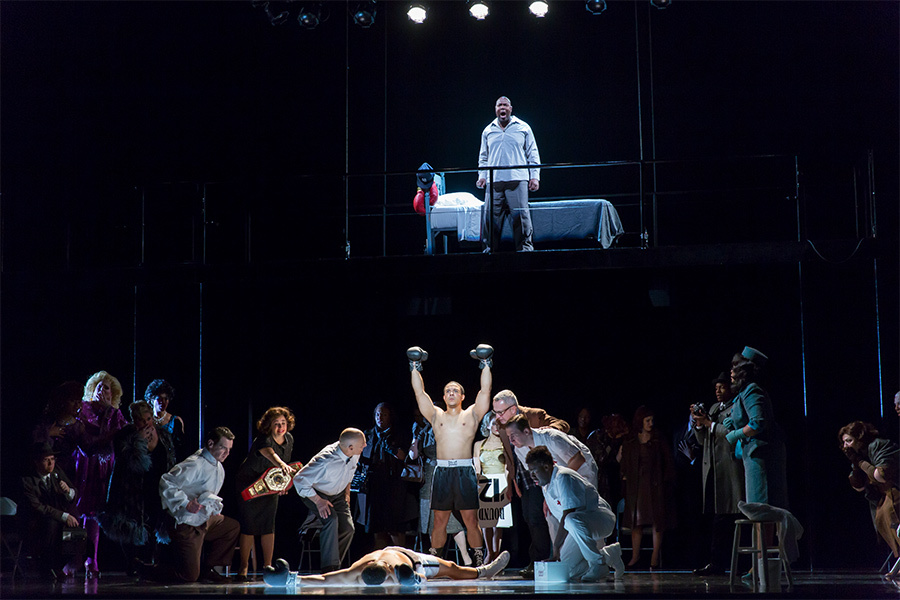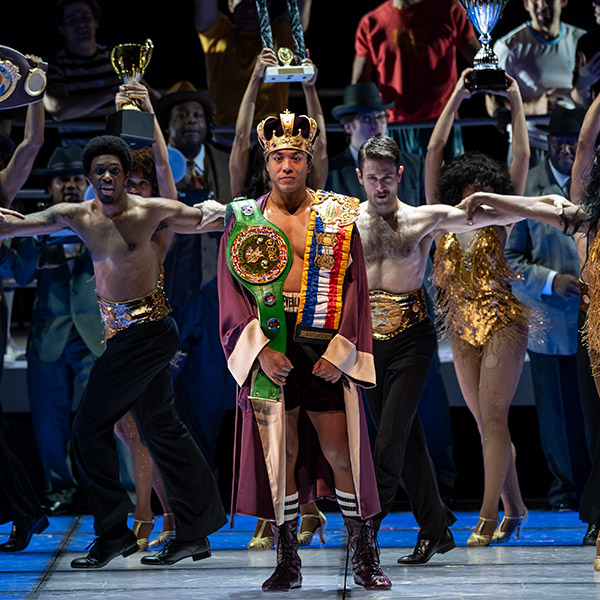January 16, 2024
The sound of today
In considering the career of Lyric’s Music Director Enrique Mazzola, one might be forgiven for thinking first of bel canto — and, of course, of early Verdi and French repertoire. But Mazzola enjoys similar international recognition as a commissioner and supporter of new work for symphony halls, opera houses, and beyond. As he takes the podium for Champion — his first 21st-century piece at Lyric — we spoke with him about the importance of music that speaks to our contemporary world.
I believe you commissioned a great deal of new music earlier in your career.
That’s true. Really it’s in my DNA. I spent five years as Artistic and Music Director of the Cantiere Internazionale d’Arte in Montepulciano, a festival created in the ‘70s by the famous and extremely innovative German composer Hans Werner Henze. Being Henze’s festival meant that it was really a showcase of what contemporary music could offer. So when I arrived in 1999, Henze asked me to continue in this vein.
What sort of works came out of that time?
We believed that commissions should be given to great composers, but should also speak to a wide range of ages and backgrounds. This made the commissions very varied and very interesting — from five-minute pieces for solo clarinet to full-scale operas — maybe 15-20 new pieces for every festival.
And then came a very productive time in Paris.
I think one of the reasons that I landed at the Orchestre national d’Île de France was my multifaceted background, because they wanted to start commissioning again. We commissioned large-scale works for orchestra. We had composers in residence — Dai Fujikura, Anna Clyne, and Alberto Colla. And above all I am proud of having created a composition competition with our orchestra.
How was that competition structured?
It was unique. Rather than playing the pieces and making someone a winner, the competition would select a small number of finalists so that they could work directly with the orchestra on their scores. The composers could check things: This note in the viola — sorry we can’t play that. This trumpet part is too high — maybe you could revise it. Ultimately, the orchestra and the audience would vote on the winner. The whole process felt very alive and the experience was very formative for me. This is one of the reasons I say that contemporary, current music is part of my musical DNA and a key part of my larger aspirations for my work at Lyric.
How do you place Terence Blanchard’s music in this regard?
I have to say that what is really unique in Terence is that he has found a modern, contemporary blend of styles. And this makes his music very attractive to me. It’s not only jazz, it’s not only opera, but it’s a modern mix.
He calls Champion “an opera in jazz.”
I completely understand his point of view. It’s not a jazz opera — it’s really a new combination.

Do you see more of this kind of work, and more commissions, in the future?
We’re still planning future seasons, so it’s not quite the moment to share exact plans, but part of our mission is to create new pieces that represent the diversity and the community of our city. To be fair, this mission began before I arrived, but I have embraced it with a passion. It’s a stream in which I feel absolutely comfortable, an area in which I can participate and actually help reinforce.
It’s interesting from a strategic point of view that many companies believe the newer works will bolster our audiences.
We are still in the opera world, and we are still very connected with the past. A vast part of our community thinks that opera is something of the past. But that means forgetting that it was vital for every opera house in the 18th and 19th centuries to have new titles, new controversies, new engagements — curiosity for discovering new young composers. It’s true that probably half of them have gone to the room of forgotten items. But probably a third of them are still in the repertoire. We cannot live only with the past. We cannot live only with old repertoire. I think that Lyric and other international companies are leading a vital new wave of commissions.
We sometimes seem to overlook the great commissioning tradition in opera.
There’s a phrase that I often use — that every piece was once a contemporary piece. It is so compelling to consider. Every piece in some way challenged the times, challenged audiences, challenged the political winds of the place where it was performed. For an audience, experiencing a piece like Champion is exactly what the audience in 1853 was experiencing with La traviata — the surprise, the controversy, the fact that it was on the edge of what was politically acceptable at the time in Italy. All this has never changed. That’s why we make new music today. It’s a way to keep our souls alert to what is around us.

